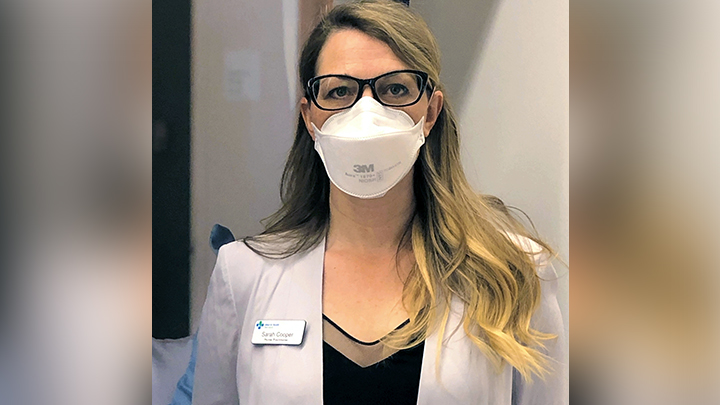
June 13, 2023

Nurse Practitioner Sarah Cooper says the breadth of information in Connect Care tells her patients’ stories when they can’t tell it themselves.
Story by Suzy Thompson | Photo by Heidi Harris-Jensen
Healthcare providers who work with brain-injury patients first began using Connect Care in November, 2019 — the program’s first launch — and today appreciate the way it streamlines communication and helps them to better understand their medical story.
To date, Connect Care is in use at the Glenrose Rehabilitation Hospital in Edmonton, the Centennial Centre for Mental Health and Brain Injury (CCMHBI) in Ponoka, and the Foothills Hospital Brain Injury Clinic in Calgary.
This electronic clinical information system is designed to house all Alberta Health Services’ (AHS), partner and affiliate medical records, and all information needed to support care wherever Connect Care is the record of care.
At the Glenrose Rehabilitation Hospital in Edmonton, which launched Connect Care in May 2022, Clinical Nurse Educator Craig Mullen oversees the site’s Stroke and Brain Injury Units. Given the numerous specialties required to treat his patients. Mullen says that Connect Care has absolutely streamlined communication between these groups.
“It's extremely multidisciplinary,” adds Mullen. “Especially with brain injury, your speech is involved, your behaviour changes, your mobilization, your activity of daily living — you're relearning a lot of things. So, you need all those different disciplines — experts in their own area — to get this person back to their highest functioning self.”
“In our brain-injury population, they often don't have a voice,” adds his colleague, Nurse Practitioner Sarah Cooper. “Many have conditions that have left them with the inability to communicate their story. They've lost the ability to speak, and for others they have no memory of the events leading up to how they wound up in hospital.
“Connect Care has really given them a voice. It's allowed us as providers to have better insight into the people they've interacted with prior to coming to our hospital — the acute care hospital, sometimes EMS transport providers, sometimes rural hospitals before the big city hospitals, and we get to see a little bit more of what it is that's happened to them.
“I would say that the information now is far more accurate than ever. It gives them the ability to tell their story, even when they can't physically tell their story.”
Roxanne Stelmaschuk, director of Adult Psychiatry, Brain Injury and Psychosocial Rehab at the Ponoka facility, further describes some of the conditions a person may suffer from a brain injury. “You can have somebody who's actually blind, unable to weight bear, no sense of balance, unable to eat, and unable to talk.”
Centennial Centre is a 300-bed facility where patients may reside from months to years, as health teams take as much time as needed for an inpatient’s recovery.
Since Connect Care’s launch there last November, Stelmaschuk also agrees that the most obvious result has been more efficient communication within the multidisciplinary teams who care for brain-injury patients.
“I can't wait until the rest of the province is on it,” says Cooper. “Connect Care has given me the opportunity to actually, in real time, to see a patient’s history, even though they can't relay it.”